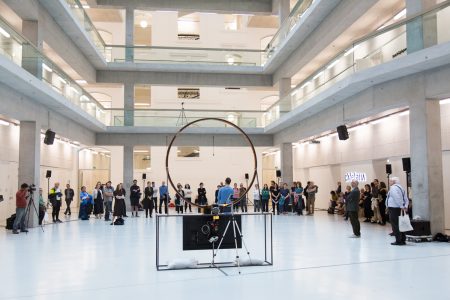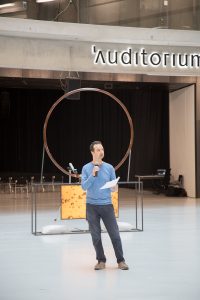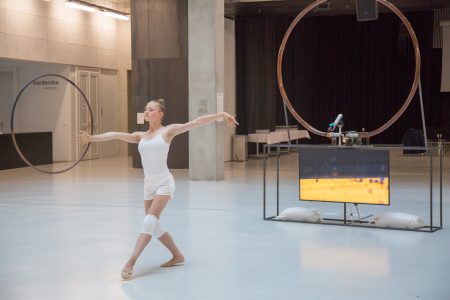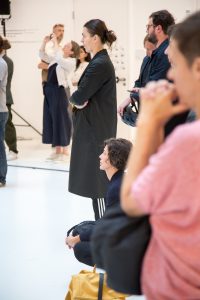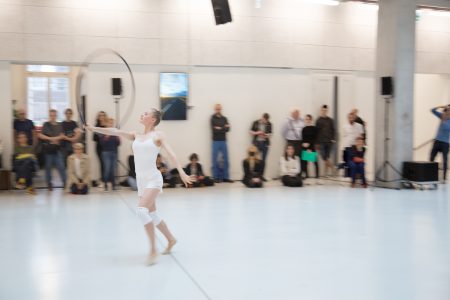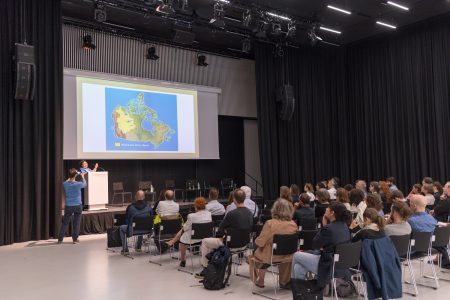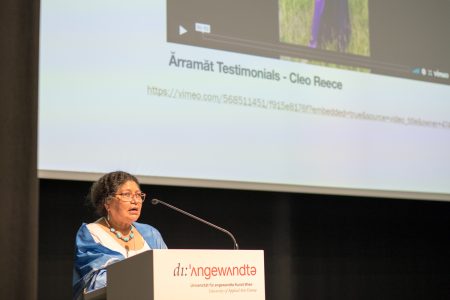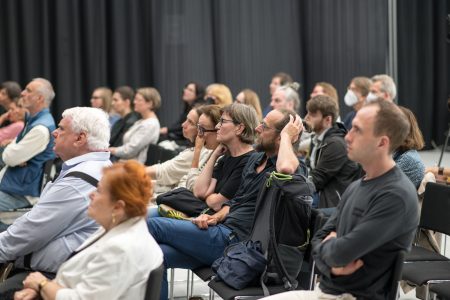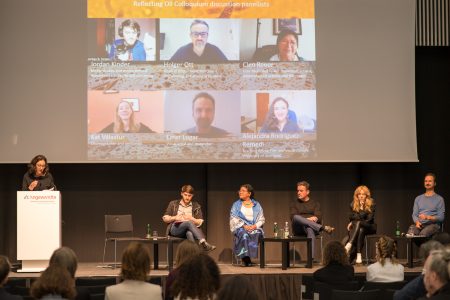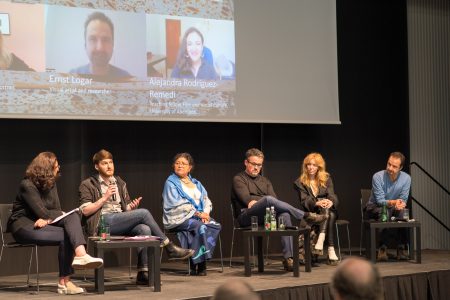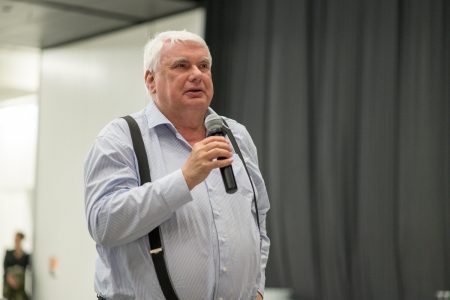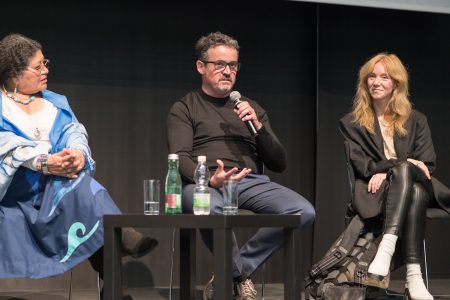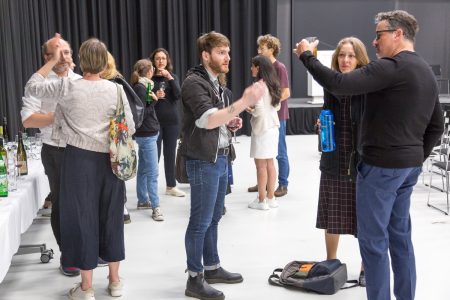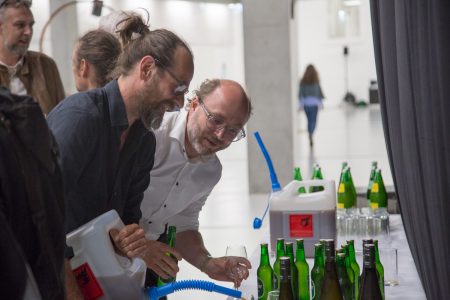Opening
9 – 12 June 2022
University of Applied Arts Vienna
Vordere Zollamtsstraße 7
A-1030 Vienna
Held at the University of Applied Arts Vienna from 9 – 12.6. 2022, the arts-based research project Reflecting Oil’s
international colloquium seeks to further propel the project’s multi-perspective rethinking of crude oil in an
effort to shed fresh light on our understanding of the socioeconomic and environmental impacts of contemporary
society’s dependence on fossil fuels, and of the urgent need for sustainable transitions to clean energy.
A public event consisting of an oil performance by invited choreographer Kat Válastur and a panel discussion
will inaugurate proceedings.
Opening: 9 June 2022, 6pm (free and open to the general public)
Performance: Kat Válastur (in cooperation with Thomas Grill (AT) and Ernst Logar)
Panel discussion: Jordan Kinder (CA), Ernst Logar (AT), Holger Ott (AT), Cleo Reece (CA), Kat Válastur (DE)
Moderation: Alejandra Rodríguez-Remedi (GB)
The inaugural event will take place at the auditorium/ atrium and will also be livestreamed from 6pm-8:30pm.
>> Open livestream
COVID-19 regulations are available at https://www.dieangewandte.at/covid19_en
Over the following days (10 – 12.6.), the colloquium will then bring together 21 participants from the worlds of
art and science to contribute to Reflecting Oil’s ongoing attempt to approach crude oil holistically through their
participation in three interdisciplinary workshops which will use artistic, theoretical and narrative working formats
respectively:
Workshop group 1 (workshop leader: Ernst Logar (AT), Leonhard Gruber (AT)
The arts-based research methods workshop is devoted to hands-on engagement with the substance crude oil
through artistic experiments conducted in the University’s laboratories.
Participants: Elisabeth Dokulil (AT), Marina Fraga (BR), Patrick Jasek (AT), Karez Abdulhameed (IQ),
Herwig Steiner (AT), Herwig Turk (AT), Andrei Molodkin (FR),
Workshop group 2 ( workshop leader: Alejandra Rodríguez-Remedi (GB))
The visibility/invisibility of oil workshop is devoted to the production of an academic text focusing on how oil’s
visibility and invisibility affect the ways it is represented culturally and perceived socially
Participants: Pit Arnold (AT), Simone Gingrich (AT), Jordan Kinder (CA), David Misch (AT), Arianna Mondin (IT),
George Osodi (NG), Elena Sorokina (FR/BE), Benjamin Steininger (AT)
Workshop group 3 (workshop leader: Ulrike Payerhofer (AT), Olaf Osten (AT))
The transitionings out of the oil age workshop is devoted to the drafting of a graphic novel exploring a creative
narrative which invites us to imagine a post-oil future.
Participants: Amanda Boetzkes (CA), Kinga Kielczynska (PL), Holger Ott (AT), Cleo Reece (CA), Johannes Schmidt (AT),
Janet Stewart (GB)
While the three workshops are not accessible to the general public, the colloquium results will be published
on the project’s website and in book form in 2023.

Biographies in alphabetical order:
Karez Abdulhameed
Karez Abdulhameed is a master’s student majoring in Drilling Engineering at the Department of Petroleum Engineering at Montanuniversität Leoben. She holds a bachelor’s degree in Petroleum Engineering from the University of Kurdistan Hewlêr and is a member of the Society of Petroleum Engineers (SPE).
Elisabeth Dokulil
After having graduated in biochemistry and after having worked in computer science for a couple of years, Elisabeth Dokulil started her training as a psychotherapist in psychoanalysis and in group analysis in 1986. Since 1994, she has worked as a psychoanalyst and group analyst in Vienna and as a trainer for group analysis and psychoanalysis in Ukraine, Russia, Bulgaria, and Albania. In 2005, she took part in the founding of Sigmund Freud University Vienna. Until 2016 she worked there as Head of the International Programme. (not participated)
Thomas Grill
Thomas Grill works as a composer and performer of electroacoustic music, and as a media artist, technologist, and researcher of sound. His artistic work encompasses many different fields of audible and trans-media art, focusing on loudspeaker-based music, electroacoustic improvisation, as well as installations and interventions. His education includes studies of technical physics in Linz, and of computer music, electronic media, and interactive electronic instruments in Vienna. He earned a doctorate in composition and music theory at the University for Music and Performing Arts, Graz. Postdoc research followed at the Austrian Research Institute for Artificial Intelligence (OFAI) in the domain of machine listening and learning. He is currently heading the university course for Electroacoustic and Experimental Music and the artistic research project, “Rotting sounds,” at the University for Music and Performing Arts Vienna. Thomas Grill has been awarded Honorary Mention at the Prix Ars Electronica, the Theodor-Körner Award, the Award of Excellence from the Austrian Federal Ministry of Education, Science and Research, the Outstanding Artist Award for Interdisciplinarity (bonus prize) from the Austrian Federal Chancellery, and various work stipends.
Jordan B. Kinder
Jordan B. Kinder is an environmental humanities and media studies scholar from what is now known as northern British Columbia and a citizen of the Métis Nation of Alberta. He studies the cultural politics of energy, media, infrastructure, and environment and holds a PhD in English and Film Studies from the University of Alberta. From 2020 to 2022, Jordan Kinder was a SSHRC-FRQSC Postdoctoral Fellow in the Department of Art History at McGill University (Montreal). This fall, he will be a Postdoctoral Fellow with the Mahindra Humanities Center at Harvard University (Massachusetts).
David Misch
David Misch holds a venia docendi at Montanuniversität Leoben (Styria), where he is appointed as Deputy Scientific Head. In 2017, he worked as an invited postdoctoral researcher at the Chair for Structural Geology, Tectonics and Geomechanics (Aachen). His work addresses classical oil and gas exploration, paleoclimate and environmental reconstructions, and geological solutions for low carbon geo-energy. For his contributions to sedimentology, he received the Hans-Höfer-von-Heimhalt and the Walther-E.-Petraschek Awards from the Austrian Geological Society and the Austrian Academy of Sciences. Furthermore, David Misch has published three books about extreme sports (Randonnée, Intensität, and 1000/24) and a novel about the role of arts under authoritarianism (Schatten über den Brettern), which was shortlisted at Das Debüt 2020 – Bloggerpreis für Literatur. Außen Innen, a collection of short stories, will be published in 2022.
George Osodi
George Osodi is a Nigerian photographer from Ogwashi-Uku, Delta State. He studied Business Administration at the Yaba College of Technology (Lagos). He worked as a photojournalist with Comet Newspaper in Lagos from 1999 to 2001 before joining the Associated Press News Agency in Lagos from 2001 to 2008. His photographs range between photojournalism and artistic documentary, covering topics from contemporary Nigerian monarchs to injustices in the Niger Delta over its natural resources. George Osodi was awarded first prize at the Fuji Africa Photojournalist of the Year Award in 2004 and was shortlisted for the Sony World Photography Award in 2009. He has exhibited at Newark Museum (New Jersey) in 2015, The Photographers’ Gallery (London) in 2012, the Stedelijk Museum (Amsterdam) in 2010, National Museum of Contemporary Art (Oslo) in 2009, and Documenta 12 (Kassel) in 2007.
Ulrike Payerhofer
Ulrike Payerhofer studied art history and cultural management in Vienna. After heading a contemporary art gallery for seven years, she joined the Angewandte as curator and senior artist in the interdisciplinary project UniNEtZ. The focus of her curatorial practice and research is on multidisciplinary collaborations and participatory methods at the intersection of arts, science, and society. Ulrike Payerhofer is currently establishing the platform Projektwerkstatt (2022 – 2024) for transdisciplinary collaborations on sustainability, which she will head from a curatorial perspective.
Johannes Schmidt
Johannes Schmidt is an Austrian Associate Professor of Energy & Resource Economics at the University of Natural Resources and Life Sciences (Vienna). His main research interests are linked to the integrated modelling of energy systems with high shares of renewables. Johannes Schmidt is interested in developing a comprehensive approach to assessing renewable energies, including technical, economic, social, and ecological aspects. During his postdoc, he worked at research institutes in the Netherlands and Brazil.
Benjamin Steininger
Benjamin Steininger is a cultural and media theorist, historian of science, and curator. He works as a postdoctoral researcher at the UniSysCat Cluster of Excellence at the Technical University of Berlin and the Max Planck Institute for the History of Science (Berlin). From 2012 to 2016, Benjamin Steininger headed a research and collection project on 100 years of oil and gas in the Vienna Basin. In 2016, he co-founded the research collective Beauty of Oil (beauty-of-oil.org) with Alexander Klose. They published the book Erdöl. Ein Atlas der Petromoderne (Berlin, 2020) and curated the exhibition Oil. Beauty and Horror in the Petrol Age at Kunstmuseum Wolfsburg (9/2021-1/2022, German/English book with the same title edited with Andreas Beitin in 2021). In 2022, Petro-Melancholie. Das Erdölzeitalter im Spiegel der Kunst, a film by Matthias Frick about their project, will be broadcasted on Arte.
Pit Arnold
Pit Arnold is a PhD candidate in Reservoir Engineering at Montanuniversität Leoben. His research interests include the investigation of rock-fluid and fluid-fluid properties under varying conditions, microemulsion formation in the reservoir during EOR processes, analysis of microemulsions, and the investigation of displacement processes using CT scanning.
Mari Fraga
Mari Fraga is an artist and researcher working in various media, such as sculpture, photography, video, painting, and installations. She is a professor at the School of Fine Arts of the Federal University of Rio de Janeiro. Mari Fraga holds an arts-based PhD in Art and Contemporary Culture, with a visiting PhD at the Konstfack University of Arts, Crafts and Design (Sweden). She was the founder of the journal Revista Carbono (www.revistacarbono.com), member of the Cooperativa de Mulheres Artistas, and head of the GAE Arte e Ecologias research group. Fraga investigates human agency in nature, the natural-artificial dichotomy, Anthropocene, climate change, fossil fuels, mining, and industrial land use. Her work proposes body-earth analogies, inspired by ecofeminism and from a Latin American perspective.
Leonhard Gruber
Leonhard Gruber works at the Institute of Art and Technology at the University of Applied Arts Vienna. There he is responsible for the administration of the department’s equipment, as well as safety-related issues in laboratory operations and equipment use. At Reflecting Oil, Leonhard Gruber supports the development and execution of experiments in the laboratory of the University of Applied Arts Vienna.
Ernst Logar
Born in 1965 in Klagenfurt (Austria), Ernst Logar has been working with photography, film, sculpture, and installations since 1995. In his work, he addresses existing power structures and historical, sociocultural, and ecological phenomena. From 1997−1999, he studied Experimental Design at the University for Art and Industrial Design in Linz, and Transmedia Art at the University of Applied Arts in Vienna from 1999−2004. He also completed the Culture and Organisation postdoc programme at the Institute for Cultural Concepts and the University of Vienna from 2006−2007. His creative work includes Non-Public Spaces (since 1998), Den Blick hinrichten (2004−2008), The End of Remembering – Carinthian Partisans (2008–2012), Invisible Oil (2008), Sustainable Transformation (2010), Place of Unrest (2012–2018), Tar Sands: Approaching an Anthropocentric Site (2016), and Reflecting Oil: Arts-based Research on Oil Transitionings (since 2019).
Andrei Molodkin
Andrei Molodkin is a Russian-born conceptual artist living and working in Paris, France. He served in the Soviet Army for two years from 1985-87 transporting missiles across Siberia. He later graduated from the Architecture and Interior Design Department at the Stroganov Moscow State University of Arts and Industry in 1992. Andrei Molodkin’s practice comprises drawing, sculpture, and installation. By making crude oil a key part of his art, he transforms this essential industrial raw material into an aesthetic form. Besides the aspect of increasing the (mercantile) value of a material that is rarely used in art, Andrei Molodkin sees the fuel—which, after all, is derived from long-dead organisms—as symbolising the cycle of life and death, a theme that is also addressed in his drawings. His work is held in a number of significant public and private collections, including the Tate national collection.
Olaf Osten
Olaf Osten is a German artist and graphic designer. His work deals with issues of nature, identity, and movement based on drawing and has been presented in numerous international exhibitions. His works are part of collections such as the International Peace Institute (New York/Manama), Wien Museum (Vienna), Complexity Science Hub (Vienna), and Austrian Chamber of Labour. He studied graphic design at the Hochschule für Angewandte Kunst und Wissenschaft (Hildesheim) and the Institute of Art, Design and Technology (Dublin). Olaf Osten has carried out many interdisciplinary projects in culture and science with Viennese partners such as the Impulstanz Festival, Wiener Festwochen, and Mumok.
Cleo Reece
Cleo Reece is Cree and a Fort McMurray #468 First Nation member. She received a Bachelor of General Studies: Education and Environmental Studies from Simon Fraser University (Vancouver). As a film festival organiser and administrator, she has been involved in media and video production in Vancouver during the 90s and early 2000s and was a key figure in the burgeoning indigenous media arts scene on the lower mainland. Cleo Reece has worked as an adult educator for Keyano College and Northland School Division (Fort McMurray) and has been involved in Cree language revitalisation and oral history. In 2011, she was elected as a Councillor for the Fort McMurray First Nation and served for three years. As the Treaty 8 First Nations of Alberta designate, she has been on the Traditional Knowledge Steering Committee for the Mackenzie River Basin Board as the Indigenous member for Alberta from 2013 to 2017. She has also served on the Treaty 8 Education Committee for over five years. Reece coordinated the Healing Gathering for the Land, Water, and People from 2015 to 2018. The Healing Gathering focused on cultural, mental, physical, and emotional healing for four years. As the founding director of the Keepers of the Athabasca Watershed Society, which merged with its sister organisation, the Keepers of the Water, she is currently the co-chair and involved in their many activities. In addition she is an elder advisor on the Aramat project which brings together a team on a six year project with focus on global biodiversity and the health and well-being of Indigenous people led by the University of Alberta and Indigenous
partners.
Elena Sorokina
Elena Sorokina is a curator and art historian. She is co-curating the Armenian Pavilion at the Venice Biennale 2022. She was chief curator of the Higher Institute for Fine Arts (Belgium) from 2017 to 2018. Between 2015 and 2017, she was a curatorial advisor of Documenta 14 (Athens/Kassel). Her exhibition, Crystal Clear: Travels in Sustainable Exhibition Making, opened at Pera Museum (Istanbul) in December 2020. Her upcoming exhibition, Forms of Fragility, opens at Rudolfinum (Prague) in October 2022. Elena Sorokina has curated exhibitions at BOZAR (Brussels), Art Brussels, WIELS (Forest), Centre Pompidou (Paris), Musée d’Art Moderne (Paris), SMBA (Amsterdam), and other institutions. (not participated)
Janet Stewart
Janet Stewart is currently Executive Dean of the Faculty of Arts and Humanities at Durham University. She joined Durham in 2014 from the University of Aberdeen as Professor of German and Visual Culture. She was the founding Director of the Centre for Visual Arts and Culture and part of the team that successfully bid to establish a Leverhulme Doctoral Training Centre for Visual Culture in Durham. She also served as Head of School of Modern Languages and Cultures from 2015 to 2018. She holds an MA and a PhD from the University of Glasgow. Janet Stewart is the author of two monographs, Fashioning Vienna and Public Speaking in the City. Her current research project develops her interests in modernity and visual culture in relation to energy, oil, memory, and sight.
Amanda Boetzkes
Amanda Boetzkes is a theorist and historian of contemporary art. Her research focuses on the relationship between perception and representation, theories of consciousness, and ecology. She has analysed complex human relationships with the environment through the lens of aesthetics, patterns of human waste, and the global energy economy. She is the author of Plastic Capitalism: Contemporary Art and the Drive to Waste (MIT Press, 2019), The Ethics of Earth Art (University of Minnesota Press, 2010), and a forthcoming book titled Ecologicity: Vision and the Planetarity of Art. Edited books include Artworks for Jellyfish (Noxious Sector, 2022), Heidegger and the Work of Art History (Routledge, 2014), and a forthcoming volume on Art’s Realism in the Post-Truth Era (2023). Her current project “At the Moraine” considers modes of visualising environments, focusing on Indigenous territories of the circumpolar North. Amanda Boetzkes is a Professor of Contemporary Art History and Theory at the University of Guelph.
Simone Gingrich
Simone Gingrich is Assistant Professor of Social Ecology, specialising in long-term socio-ecological research at the University of Natural Resources and Life Sciences (Vienna). Her research investigates the historical emergence of sustainability challenges connected to land and resource use, focusing on the links between forest recovery and industrialisation processes and the emerging climate impacts. Simone Gingrich’s academic background is in ecology and social ecology.
Patrick Jasek
Patrick Jasek is a PhD candidate in Reservoir Engineering at Montanuniversität Leoben. His research interests include carbon capture, utilisation, and storage, geothermal energy recovery and utilisation, hydrogen storage and mobility, hydro- and geochemistry, power-to-gas technologies, and subsurface engineering.
Kinga Kieczyska
Kinga Kieczyska is a post-disciplinary artist from Poland who graduated from the Sandberg Institute and the Gerrit Rietveld Academie (Amsterdam). Her work examines humanity’s interaction with nature. She advocates for a reductionist logic to replace the prevalent logic of productive growth. To emphasise her works’ physical extension into their context and modes of production, she refers to them as “environments.” Kinga Kieczyska’s work has been shown at Exile Gallery (Vienna), Manifesta 12 (Palermo), Museum of Contemporary Art (Belgrade), Museum of Modern Art (Warsaw), Mediamatic (Amsterdam), Aether Art Space (Sofia), SAVVY (Berlin), FOAM(Amsterdam), and De Appel (Amsterdam).
Arianna Mondin
Arianna Mondin studied architecture at the Università Iuav di Venezia (Venecia) and at the Akademie der bildenden Künste (Vienna). She is a PhD student in the Department of Architecture and Design at the University of Genova. She is part of the editorial staff of Vesper, Rivista di Architettura, Arti e Teoria—an academic journal of the Department of Architecture and Arts of the Università Iuav di Venezia (Venecia). Arianna Mondin is a member of the research unit PRIN for research on “SYLVA – Rethink the sylvan: Towards a new alliance between biology and artificiality, nature and society, wilderness and humanity.”
Holger Ott
Holger Ott is Chair of Reservoir Engineering in the Department of Petroleum Engineering at the University of Leoben. Since 2011, he has been Visiting Reader at the Department of Earth Science & Engineering at Imperial College London and at Rheinisch-Westfälische Technische Hochschule Aachen. Holger Ott has experience in both academia and industry, including positions at Shell, the University of Cologne, and the Free University of Berlin. His research focuses on geological aspects of sustainable energy technology development.
Alejandra Rodríguez-Remedi
Alejandra Rodríguez-Remedi first collaborated with Ernst Logar in 2008 when working on the Scottish oil industry. She has contributed to Reflecting Oil as a proposal writer and researcher since 2017. She gained experience in holistic methodological approaches on several major educational research projects at the University of Concepción in Chile (1998-2002). Alejandra Rodríguez-Remedi was awarded a PhD by Gray’s School of Art (Aberdeen) in 2007. She currently works as a Teaching Fellow in Film and Visual Culture at the University of Aberdeen.
Herwig Steiner
Herwig Steiner is a media artist, filmmaker, and musician. He develops, designs, produces, and promotes a wide range of art projects across all media disciplines. “His playful experiments focus on those phenomena in which virtual reality enters the real world” (Alex Samyi, Museum am Bach). “Herwig Steiner critiques public discourse through rationality and art” (Peter Weibel). He studied Media Art at the University of Applied Arts, Vienna, where he was an assistant for many years to Peter Weibel. Herwig Steiner’s artistic expressions also manifest in his participation in art or music projects such as (MA:HST), Die Großen Ferien, The Carpet Brothers, and Sirupop.
Herwig Turk
Herwig Turk lives and works in Vienna. His projects probe the interconnectivity of the fields of art, technology, and science. In recent years, his work has been shown at venues such as Kunsthaus Wien (Vienna), the Museum of Applied Arts (Vienna), the Museum of Modern Art (Carinthia), the Seoul Museum of Art, the Neues Museum Weserburg (Bremen), the Media Art Laboratory TESLA(Berlin), the Galerie Georg Kargl (Vienna), and Transmediale (Berlin). Since 2014, Herwig Turk has worked as Senior Artist in the department of Social Design at the University of Applied Arts Vienna.
Kat Válastur
Kat Válastur is a Berlin-based choreographer and performer. Her choreographic works are defined by the creation of transformative experiences on stage. In her work, the bodies manifest the ways that power structures are experienced and are embodied. Through the use of the mythical as a tool, she creates a condition that is charged with historical, fictional, social, and personal experiences. This mythical construction that channels reality becomes a speculative topos and a force field that the performers inhabit. Kat Válastur’s precisely crafted choreographies are defined by the way the bodies are subjected to power and the way they slowly turn it into a position of resistance. The choreographic conditions that she creates and which she calls “force fields” lay the foundation for her and the performers to develop a dance language that centres around transformation. Her work has been presented in Germany and abroad.
colloquium I University of Applied Arts Vienna I interdisciplinary I arts-based research I fossil-fuels I ecology I energy I crude oil I
